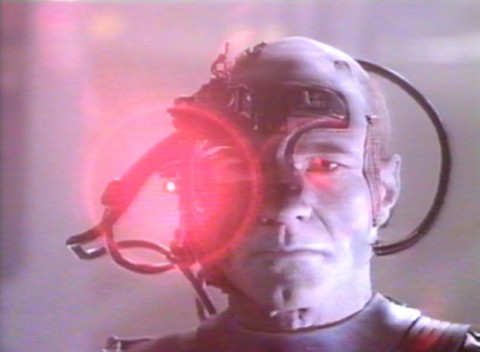May 25, 2009
Ray Kurzweil wants to be a machine
Source: Newsweek (May 25 issue), original story by Daniel Lyons.
Somebody call the Borg. Ray Kurzweil actually wants to be assimilated; To become the man-machine hybrid of sci-fi and cyberpunk lore. He has given speeches about the fabled “Singularity” where machine intelligence supplants human intelligence and the meat is no longer needed… or possibly wanted. But Kurzweil also believes that the Singularity presents an opportunity for humanity to forever alter the course of evolution by merging with machines. He is hopes to be one of the lucky ones to be assimilated, and is currently preparing for the event by dieting and taking supplements to get his biochemistry ready. He expects The Singularity to happen around 2045, when he will be 97. Kurzweil may be cutting it a little close.
Ray Kurzweil’s wildest dream is to be turned into a cyborg—a flesh-and-blood human enhanced with tiny embedded computers, a man-machine hybrid with billions of microscopic nanobots coursing through his bloodstream. And there’s a moment, halfway through a conversation in his office in Wellesley, Mass., when I start to think that Kurzweil’s transformation has already begun. It’s the way he talks—in a flat, robotic monotone.
… and you thought a fossil can piss a creationist off? Ray Kurzweil has is share of detractors who call him a bona fide wingnut:
P. Z. Myers, a biologist at the University of Minnesota, Morris, who has used his blog to poke fun at Kurzweil and other armchair futurists who, according to Myers, rely on junk science and don’t understand basic biology. “I am completely baffled by Kurzweil’s popularity, and in particular the respect he gets in some circles, since his claims simply do not hold up to even casually critical examination,” writes Myers. He says Kurzweil’s Singularity theories are closer to a deluded religious movement than they are to science. “It’s a New Age spiritualism—that’s all it is,” Myers says. “Even geeks want to find God somewhere, and Kurzweil provides it for them.”
Even one of Kurzweil’s colleagues said “Ray is going through the single most public midlife crisis that any male has ever gone through.”
Kurzweil, being the futurist that he is, has made some other out-there predictions that were nowhere near true. But there may be a real deep-seated reason why some are hating The Singularity so intensely:
(Peter) Diamandis says academics who scoff at The Singularity are just threatened because the established order will be disrupted. “These technologies can topple major companies, even governments,” he says. “All these ideas are about empowering the individual.”

Friend or Foe? One major question about The Singularity yet to be answered is: Will the machines even want us around? Ray Kurzweil believes they will, but we will have to wait until 2045 to know for sure.
That’s assuming some ultra-religious dickhead doesn’t make the 2012 “apocalypse” a self-fulfilling prophecy.






